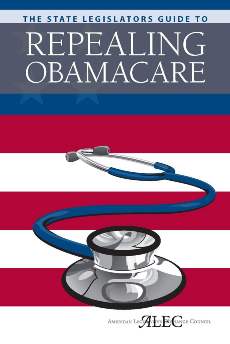
Commentary: ALEC Releases Guide to Repealing ObamaCare
Just as the “Hippocratic Oath” counsels medical professionals to avoiding doing any harm to patients before beginning surgery, state lawmakers should guard against harmful policy measures that inflate costs and undermine service. The Patient Protection and Affordable Care Act, also known as ObamaCare, will result in overburdened Medicaid programs, higher taxes and unconstitutional requirements, unless it is stopped cold. To this end, The American Legislative Exchange Council (ALEC) has released the “State Legislators Guide to Repealing ObamaCare,” which endorses free-market alternatives for healthcare reform that can be introduced in tandem with repeal efforts.
With more than 2,000 members, ALEC is the nation’s largest, non-partisan, individual membership association of state legislators. One-third of all state legislators belong to ALEC as do more than 250 corporate and private foundations.
Thus far, lawmakers in 42 states have either introduced or announced their support for ALEC’s Freedom of Choice in Health Care Act, modeled on Arizona’s Proposition 101. This is the primary legislative vehicle for “state pushback of the individual mandate and Canadian-style single-payer healthcare,” according to the guide. Louisiana figures prominently into this equation. Last May, the state’s House of Representatives voted 59-15 to cancel out the insurance mandate in ObamaCare. Rep. Kirk Talbot (R-River Ridge), who sponsored House bill 1474, said at that time that Congress had overstepped its authority under the Commerce Clause of the U.S. Constitution.
In 2008, ALEC endorsed model language for the alternative legislation, which was co-authored by the Goldwater Institute, a free-market think tank based in Arizona, and Dr. Eric Novack, a Phoenix-area orthopedic surgeon and founder of the U.S. Health Care Freedom Coalition. The legislation, which shields individuals, employers and healthcare providers, from being coerced into making federally directed purchases, can be introduced either by statute or a constitutional amendment.
“ALEC’s Freedom of Choice in Health Care Act, if passed by statute, can provide a state-level defense against ObamaCare’s excessive federal power,” the report observes. “Particularly, the measure can provide standing to a state participating in current litigation against the federal individual mandate; allow a state to launch additional, 10th-Amendment-based litigation if the current lawsuits fail; and empower a state attorney general to litigate on behalf of individuals harmed by the mandate once it goes into effect in 2014.”
It is evident from the past few months that the protections against federal power grabs included in ALEC’s bill appeal to lawmakers in both parties. Virginia and Louisiana both passed the legislation with support from Democratic state legislators. Furthermore, in Missouri, one in six Democrat primary voters pulled the lever for Proposition C, Missouri’s Freedom of Choice in Health Care Act statutory referendum.
As part of its “pushback” strategy ALEC also advises states to reject the discretionary grants made available through ObamaCare. While they may seem attractive on the surface, these grants come with “strings attached” that would compel states to enforce federal policy, the report explains. In 2010, former Minnesota Gov. Tim Pawlenty signed an executive order prohibiting state agencies from applying for ObamaCare grants. Alaska, Iowa and Georgia have also resisted federal overtures.
While these efforts are an important part of the overall strategy, ALEC members should not be resigned and limited to defensive postures, the Guide explains. Instead, ALEC encourages state officers to work aggressively on behalf of alternative legislation that more fully exploits America’s free market system.
“Playing defense against the Patient Protection and Affordable Care Act is essential in taming excessive federal power,” the Guide acknowledges. “But true reform means that state legislators cannot `just say no’ to the designs of Congress. The 10th Amendment affirms that states have a big role to play in policy matters ‘not delegated to the United States by the Constitution, nor prohibited by it to the States.’ Health care is no exception—and state legislators must move forward with a pro-patient, market-driven health reform agenda.”
Kevin Mooney is the Investigative Reporter with The Pelican Institute. He can be reached at kmooney@pelicanpolicy.org




